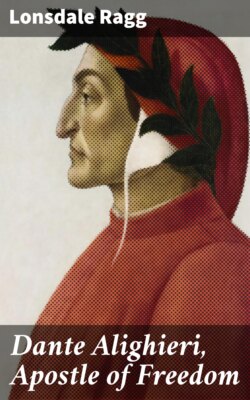Читать книгу Dante Alighieri, Apostle of Freedom - Lonsdale Ragg - Страница 5
PROLOGUE
DANTE, APOSTLE OF LOVE
ОглавлениеBut we all with unveiled face, reflecting as a mirror the glory of the Lord, are transformed into the same image, from glory to glory.—2 Cor. iii. 18.
These words form the sequel of to-day’s Epistle[10] in which the temporary reflection of the Shekinah in Moses’s face is contrasted with the permanent and complete illumination of the Spirit. They form the climax of a passage which, full of mystery and splendour, leads us up to those things which eye hath not seen nor ear heard—to that beatific Vision prepared for God’s unfeigned lovers, who shall shine with His own likeness because and when they “see Him as He is.”
A month from to-day—on the day of the Holy Cross—we shall be celebrating the six hundredth “birthday” into the world beyond of the man whose eagle vision pierced, dazzled but unafraid, into the blazing glory of Paradise—Dante, the pilgrim of the world to come. St. Paul’s inspired and inspiring words bring back to mind the swift upward movement of Dante’s Paradiso, where the spirit mounts from sphere to sphere, from glory to glory, impelled and wafted by the sheer force of Love, till at last, in face of the Triune blessedness, it is plunged into an ineffable joy and wonder—ineffable because, as he says, “as it draweth nigh to its ideal, the object of its longing, our intellect sinketh so deep that memory cannot go back upon the track”—
Perchè, appressando sè al suo disire
Nostro intelletto si profonda tanto,
Che dietro la memoria non può ire.[11]
The glory of which we speak—which makes the Paradiso a marvel of dazzling, but, so to speak, graduated splendour—is the glory of Love, Divine and human; and it is of Dante, the Apostle of Love, that I would speak to you to-day. In this sexcentenary year all the civilised world is acclaiming him, and it is well that our Christian Churches should echo thanksgiving to Almighty God for this most Christian poet, and for the magnificent bequest that he left, not only to Italian literature, but to the world. The Pope in his encyclical last spring[12] bore eloquent testimony to Dante’s loyalty to the Christian heritage, and to the power by which, as a teacher of the Faith, “he being dead, yet speaketh.”
He speaks, indeed, with a voice from six hundred years ago, yet not in the remote language of one nurtured in leisure, ease, and comfort, far from the annoyances and disappointments, the worries and anxieties and ugly problems of the rough-and-tumble world we know. On the contrary, the world in which Dante prayed and strove and studied and dreamed and wrote-the world from which comes down to us the serene glory of his Paradise of Love—was astonishingly like our own on its uglier side: a world of religious and political unrest, of clashing interests and ideals, of faction, violence, and cruelty, of individual and corporate predatory self-assertion; a world in which the poet himself, called to “abandon all that man holds most dear”—
Ogni cosa diletta
Più caramente[13]—
wrought out his great work as a nameless wanderer, and died in bitter exile. So we may listen to him as to one who has a genuine message for us.
